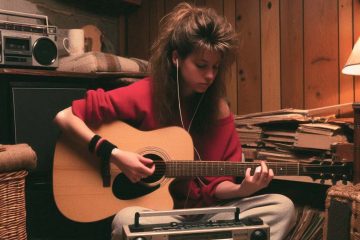(If you haven’t read part 1 of The 10,000 Hours Meme is Wrong, I’d recommend doing that to get the most out of this post.)
Practising Or Playing?
If you play an instrument you might have taken lessons like I did. I learnt guitar using A Modern Method for Guitar. It’s a great book and I still recommend it to any guitarists who want a solid foundation in guitar.
I was taught to read music and there were lots of rudiments and exercises that gradually built on each other to help you become incredibly proficient at guitar if you were diligent. Unfortunately I didn’t finish the whole book but it did help lay a solid foundation
What was more fun was learning to play the songs of artists and bands I started to get into when I was 15. This had the effect of deliberate practice by teaching me new techniques and skills but it was less organised and the goal wasn’t mastery, it was to play the songs. Not a bad goal of course.
For many musicians who practice, there can be a fine line with just playing a song versus deliberately practicing the song so you can master it. Playing through a song a few times without focussing in on any areas that need work isn’t deep practice. If anything, you’re just practicing your mistakes.
Why Do We Avoid Deliberate Practice?
If I think back, I actually didn’t hate practising from my textbook but like most kids I just wanted to get my practice time done. Playing an etude through, even with mistakes, feels more rewarding than the slow it down, play it slowly, stop when you make a mistake, okay now speed it back up again and play it in context approach.
I am thankful for the foundation laid by my guitar teacher. I’ve revisited this book as an adult and had some amazing results by using it for deliberate practice. It was quite remarkable and inspiring.
After musing on why we avoid the practice we so desperately need to grow and master our art as musicians and songwriters, I can pin it down to two things for myself. Finding a “silver bullet” and “risk aversion”.
The Silver Bullet
Who doesn’t want to find a quick solution to a difficult problem? The whole marketing industry works on the principle of the silver bullet. “Buy this and all your dreams will come true”.

I can prove this by showing you all the unused plugins on my computer which I purchased hoping it would solve mixing problems for me. Unfortunately instead of investing the work required, I tried to buy myself a shortcut.
It’s not that those plugins aren’t great and can’t do amazing things (some of them actually did really help). In reality, when it comes to any artistic pursuit, you simply need to invest in the right work. Do the hard things that need to be done. Why do they need to be done? Because learning a skill is physiological.
Meet Mr Myelin
Knowing why we can’t buy a shortcut for skill is actually incredibly important. So let me introduce you to Myelin.
Myelin is a fatty substance that forms a sheath around nerve fibres (axons) in the brain and spinal cord. This myelin sheath acts as an insulator, allowing electrical signals to travel faster and more efficiently along the axons. Sort of like insulation around wires but better.
The thicker the myelin sheath, the faster and more efficiently the signals can travel, leading to improved performance and skill acquisition. When we learn a new skill, the neural pathways associated with that skill are repeatedly activated. This repeated activation triggers the production of myelin, which strengthens and reinforces these pathways. We feel this reinforcement as getting better at a skill.

This is why practice and repetition are essential for mastering any skill. As we practise, we are essentially encouraging the myelination of the right neural pathways, making them more efficient and allowing us to perform the skill with greater ease and accuracy.
Myelination plays a key role in turning slow, clumsy movements into smooth, effortless actions. It’s the key to transforming a novice into an expert.
Deliberate practice will genuinely change your life because it changes your brain. Unfortunately not many people want to hear this as a marketing message. That probably why there is lots of money to be made marketing silver bullets to musicians and artists.
Risk Aversion
You might think it’s laziness that stops people from deliberate practice but I think it goes deeper than that. We can all be lazy at times and that’s not really an issue because laziness isn’t a perpetual state.
When I think about why we don’t commit and embrace the deep deliberate practice that will truly transform our abilities,it’s risk aversion. It’s the voice that says “What if I spend all of this time, energy, money and it doesn’t work?”.
We don’t want to get it wrong.
No one wants to invest years of practice and find out they can’t get the payoff they imagined they’d get. Maybe it’s safer to sit back and enjoy life like the rest of these people. They seem to be doing just fine binge watching Netflix or doom scrolling their social media platform of choice.
After I was having these thoughts I happened to read this in the talent code:
“Being highly motivated, when you think about it, is a slightly irrational state. One forgoes comfort now in order to work toward some bigger prospective benefit later on. It’s not as simple as saying I want X. It’s saying something far more complicated: I want X later, so I had better do Y like crazy right now.
We speak of motivation as if it’s a rational assessment of cause and effect, but in fact it’s closer to a bet, and a highly uncertain one at that. (What if the future benefits don’t come?)”
“The Talent Code” Daniel Coyle p106
Embracing The Journey
Songwriters who are pursuing their craft are therefore behaving a little irrationally. We’re hoping the work we do today pays off somewhere in the future. What the payoff will be varies for each person and it also shifts as we go along our journey.
I know for myself when I was fresh out of high school that I wanted to be a singer. I auditioned to get into music school for a singing degree. Thankfully they gave us a questionnaire before we auditioned which asked us what our goals were in music. From my answers the astute professors felt I’d be better off studying music composition – and I was.
After graduating, I thought I wanted to write songs, be the frontman for a band and tour. As much as I liked the songwriting and playing in the band I wasn’t that keen on touring. That led me to focus on studio craft. I found a deep love for not only writing and recording my own music but the music of others.
After years of producing artists and bands I worked on mixing a couple of projects that I hadn’t recorded. I realised how much I enjoyed this aspect of the production process and 6 years later I decided to focus on that.
At no point before I decided I wanted to focus on mixing and mastering did I feel dissatisfied. I experienced the struggle but something inside drove me on and I enjoyed the journey. As I went I was compelled to move in a certain direction which led to greater fulfilment. All the while I was gaining experiences and practice that helped to give more mastery in mixing.
The Takeaway
Deliberate practice is the only way to progress your skills toward mastery. Not only does our brain physiology make it that way but most of us have experienced it personally and know it’s the truth.
I look back fondly on times of intense skill growth. At the time it probably wasn’t nearly as enjoyable as I remember but the results were noticeable and inspiring.
For me it comes down to this point, songwriters and music producers have access to all of the same equipment to make great sounding music. There is really no barrier to entry.
This means it will be those who master their songwriting and production craft that will create songs that will stand out. That means you need to practise. That means you need a system and a plan.
That’s what we’ll talk about in the next blog post. Until then, all the best with your music making.



0 Comments